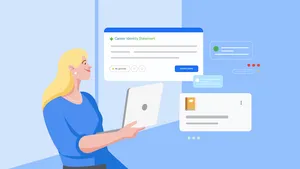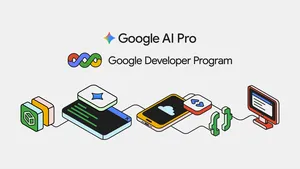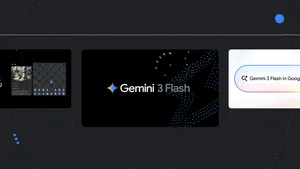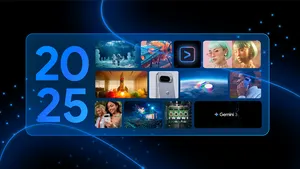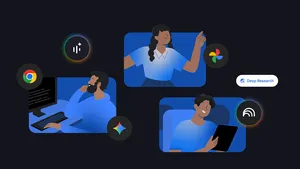Go with the flow state: What music and AI have in common

Carrie Cai, Ben Zevenbergen and Johnny Soraker all work on developing artificial intelligence (AI) responsibly at Google, in the larger research community and across the technology industry. Carrie is a research scientist focusing on human-AI interaction, Ben is an ethicist and policy advisor and Johnny is an AI Principles ethicist. They all work within a global team of experts from a variety of fields, including the social sciences and humanities, focused on the ethical development of AI. They’re driven to make systems that are fair, inclusive and focused on people.
But they have more than their work in common: They’re all accomplished musicians who’ve studied music, composed and published pieces and even played at the professional level. We wanted to know more about their musical backgrounds, and how this creative interest informs their work building AI systems that take everyone into account.
What instrument — or instruments — do you play?
Ben: Guitar, bass and drums.
Johnny: Mainly drums these days, but I’ve also done ambient and electronica.
Carrie: I play piano and I also compose music.
Where did your interest in playing music come from?
Ben: I grew up in a musical family where instruments were always lying around. My parents’ friends would bring their instruments when they came to visit and our house would turn into a music venue. I enrolled in a music degree in my late teens to become a professional drummer. Then, a year later, I serendipitously became a bassist: I went to law school in the Netherlands, and the university band already had someone who was a better drummer than I was — but they needed a bassist, so I grabbed the opportunity.
Carrie: I started out in the Yamaha music program when I was six, where rather than learning technical piano playing skills you focus on ear training, hearing the music and how to play as an ensemble. I think that foundation led me to be a lot more creative with my music than I would have been otherwise. I spent part of my childhood years composing music, too — here are some of my early compositions from my high school days!
Johnny: I’ve played lots of instruments since I was a child, but never had the tenacity to get very good at any of them. Perhaps as a result of this, I got involved with a highly experimental ambient scene in the early 2000s and started the one-man project Metus Mortuus, using samples and DIY equipment to create often disturbing soundscapes. It was really only when I got hooked on the video game “Rock Band,” where you play "fake" instruments along with the notation on screen, that I put in the hours needed to get some basic limb independence and with that a platform for learning real drums.
Carrie speaking at a conference about musical creativity and brain science.
Ben playing the bass during a concert in Amsterdam.
Johnny speaking at a TedX talk.
Did you gravitate toward the drums in the game?
Johnny: No, I hardly ever touched them — I simply couldn’t make my left arm do something my right arm wasn't doing, but one day I decided to try an experiment: Can I make these stale neural pathways of mine actually learn something new well into adulthood? I started practicing on these toy drums every day, which was painful and frustrating, but occasional breakthroughs kept me going. Eventually I achieved a level of limb independence I hadn't thought I was capable of. I invested in proper e-drums and I’ve played almost every day since.
What’s your favorite thing about playing?
Johnny: It's really the ultimate flow experience, where you're fully immersed in an activity to the extent you lose track of time and only focus on the present moment. There’s lots of empirical research in the field of positive psychology suggesting that regular flow experiences promote better well-being.
Ben: I love playing the bass with a band because it’s the glue between the rhythm section and the melody sections. It’s fun when you purposefully come in a beat later, you really see people not sure whether to dance or not. When you start playing, suddenly the whole audience understands what’s going on. And then they have the audacity to say they never hear the bass!
How has music made its way into your work, if at all?
Carrie: It’s certainly affected how I think about my work today, particularly around how to make AI more controllable to everyday people. For example, we’re now seeing these new, highly capable generative AI models that can compose music sounding indistinguishable from something written by Bach. But we discovered that, just because an AI model is capable of making beautiful music, doesn’t mean humans can always make beautiful music using AI.
When I create music, I’m thinking, “I want the beginning of the song to sound cheerful, then I want it to build tension, before ending in a somber way.” When I’m creating with AI, it can be difficult to express that — I can’t easily say, “Hey AI, make the first part happy and then build tension here” This can make it difficult for people to feel a sense of artistic agency and authorship when they’re creating any kind of content with AI.
Recently, I collaborated with other human-computer interaction (HCI) and machine learning (ML) researchers at Google to create new tools enabling people to steer and control AI as they compose music with it. We found that these “steering tools” significantly boost users’ sense of creative ownership and trust as they compose with AI.
Do you think there’s anything about the sort of work you do that exercises the same sort of “mental muscles” as music does?
Johnny: Yes, I think the key to ethics — and especially ethics of AI where there often is no precedent — is to be able to approach a problem from different angles and draw connections between the case at hand and relevant, similar cases from the past. This requires you to think creatively. And I feel that the way in which drumming almost literally rewired my brain has made me much better at doing that.
Ben: When you learn to play the drums, one of the hardest things is learning you must separate the movements of your limbs in your mind. It's pretty difficult to process — which makes it a very nice experience once your mind can asynchronously control parts of your thinking to create interesting rhythms that are still in time. I think for my work on ethics of technical design, I have to frequently understand many interacting but very different disciplines. I'm not sure if it has anything to do with drumming, but I find that I can think about these things in tandem, while they are completely different.
Carrie: I remember once when I was little, I woke up and without even changing out of my pajamas, spent the entire day composing a piece of music. I realize now that that was a flow state — I was working on something that was challenging yet doable. I think that’s a key property of creativity and it’s affected how I work in general. It's easiest for me to be productive when I'm in that state — working on something that’s challenging, but not so difficult that I won't want to start it or keep going. That’s helpful in research because there’s so much uncertainty — you never know if your experiments are going to work! But I can take a lesson from how I got into that flow state with music and apply it to research: How can I as a research scientist enter a flow state?

